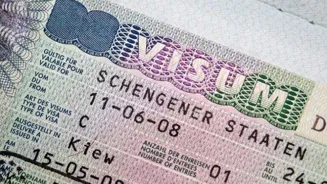What is the story about?
The Schengen visa, which allows stays of up to 90 days within 180 days in European countries, recently grabbed headlines for undergoing a digital revamp. The paper-based application and traditional visa sticker will be replaced by a safe, encrypted 2D digital barcode, with complete deployment planned by 2028, according to The Economic Times.
However, applying for a Schengen visa can be a meticulous procedure, with the visa interview being one of the most important steps. Schengen visas are often cited as being difficult to obtain, with higher rejection rates compared to some other visa types. According to Atlys, Schengen countries rejected about 1.6 million visa applications as of 2023.
How to Prepare for a Schengen Tourist Visa Interview?
The Schengen visa interview is a vital part of the application process for those wishing to travel to Europe's Schengen Area. It's an opportunity for visa officers to verify the information in your application and assess your eligibility. While it may seem daunting, a combination of honesty, organisation, and confidence can help you navigate it smoothly.
Mistakes to Avoid During a Schengen Visa Interview
While the visa interviews are not difficult, many applicants make common mistakes that result in denial. To increase your chances of clearing the Schengen visa interview, here are some common mistakes to avoid, according to Atlys.
Inconsistent Answers: Ensure your responses match your application and documents. Double-check what you submit and practice answering common questions to maintain consistency.
Disorganised Documents: Keep your paperwork organised and easily accessible. Make sure you have all required documents, including original copies and photocopies.
Over-Explaining or Vagueness: Stay focused on the question being asked and provide concise, specific answers. Avoid vague responses that don't add value to your application.
Nervousness and Defensiveness: Stay calm and composed during the interview. Take a deep breath before answering, and don't hesitate to ask for clarification if you are unsure about a question.
Lack of Trip Details: Be clear about your travel dates, itinerary, and accommodation details. Show that your trip is well-planned and genuine.
False Information: Provide accurate and truthful information. Exaggerating income, faking bookings, or giving incorrect details can lead to rejection or a travel ban.
Here are key tips for effectively preparing for your Schengen visa interview:
Be familiar with all details provided in your application, which includes your travel dates, itinerary, sponsorship letters and others. Ensure that your answers during the interview align perfectly with the information submitted.
Prepare your responses to frequently asked questions such as your background, employment, purpose of travel, and ties to your home country.
Carry a neat and well-organised file with all necessary documents, both originals and copies. Ensure you have all necessary documents, such as your passport, visa application form, travel insurance, flight and accommodation bookings, financial statements, and so on.
ALSO READ | US Visa Interviews: How to prepare and what not to say during interviews
Dress professionally or in business casual attire to make a positive impression.
Arrive at the interview location well in advance (15-20 minutes is recommended) to allow for check-in and settling in.
It is crucial to be truthful and accurate and never lie or exaggerate, as visa officials are trained to identify discrepancies and dishonesty, which can lead to immediate rejection.
However, applying for a Schengen visa can be a meticulous procedure, with the visa interview being one of the most important steps. Schengen visas are often cited as being difficult to obtain, with higher rejection rates compared to some other visa types. According to Atlys, Schengen countries rejected about 1.6 million visa applications as of 2023.
How to Prepare for a Schengen Tourist Visa Interview?
The Schengen visa interview is a vital part of the application process for those wishing to travel to Europe's Schengen Area. It's an opportunity for visa officers to verify the information in your application and assess your eligibility. While it may seem daunting, a combination of honesty, organisation, and confidence can help you navigate it smoothly.
Mistakes to Avoid During a Schengen Visa Interview
While the visa interviews are not difficult, many applicants make common mistakes that result in denial. To increase your chances of clearing the Schengen visa interview, here are some common mistakes to avoid, according to Atlys.
Inconsistent Answers: Ensure your responses match your application and documents. Double-check what you submit and practice answering common questions to maintain consistency.
Disorganised Documents: Keep your paperwork organised and easily accessible. Make sure you have all required documents, including original copies and photocopies.
Over-Explaining or Vagueness: Stay focused on the question being asked and provide concise, specific answers. Avoid vague responses that don't add value to your application.
Nervousness and Defensiveness: Stay calm and composed during the interview. Take a deep breath before answering, and don't hesitate to ask for clarification if you are unsure about a question.
Lack of Trip Details: Be clear about your travel dates, itinerary, and accommodation details. Show that your trip is well-planned and genuine.
False Information: Provide accurate and truthful information. Exaggerating income, faking bookings, or giving incorrect details can lead to rejection or a travel ban.
Here are key tips for effectively preparing for your Schengen visa interview:
Be familiar with all details provided in your application, which includes your travel dates, itinerary, sponsorship letters and others. Ensure that your answers during the interview align perfectly with the information submitted.
Prepare your responses to frequently asked questions such as your background, employment, purpose of travel, and ties to your home country.
Carry a neat and well-organised file with all necessary documents, both originals and copies. Ensure you have all necessary documents, such as your passport, visa application form, travel insurance, flight and accommodation bookings, financial statements, and so on.
ALSO READ | US Visa Interviews: How to prepare and what not to say during interviews
Dress professionally or in business casual attire to make a positive impression.
Arrive at the interview location well in advance (15-20 minutes is recommended) to allow for check-in and settling in.
It is crucial to be truthful and accurate and never lie or exaggerate, as visa officials are trained to identify discrepancies and dishonesty, which can lead to immediate rejection.



















